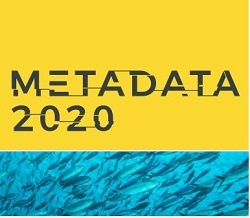METADATA 2020 : details and crosswalks of the recommendations. Can we agree?


(Image sources: METADATA 2020 initiative & UKSG Conference 2017)
Is it possible to achieve high quality metadata at the institutional level?
A new ambitious METADATA 2020 initiative's belief is that investing in richer metadata* should be the scholarly community’s top priority.
Good, satisfactory, open, connected and re-usable metadata reduces mis-communication and mis-interpretation, fuels discovery and innovation, bridges the gaps between systems and communities, and eliminates duplication of effort.
Although metadata is considered to be one of the most powerful tools available in support of scholarly communication, different organisations are still standing in front of several problems related to receiving unsatisfactory or inadequate metadata from publishers which should be delivered to the different authorized institutional repositories.
To create awareness and resources for all who have a stake in creating and using scholarly metadata, in September 2017 METADATA 2020 was launched.
"One of the interesting ingredients for success in several current metadata projects is agreement across communities about what metadata are important for various use cases... We have collected recommendations from 10-20 organizations and communities as part of an NSF Project aimed at evaluating metadata collections in various dialects with respect to these recommendations. |
METADATA 2020 will demonstrate WHY richer metadata should be the scholarly community’s top priority, how we can all evaluate ourselves and improve, and what can be achieved when we work harder, and work together.
To that end :
METADATA 20202 will be offering many opportunities for GETTING INVOLVED involved: workshopping, listening, creating, evaluating, and developing. Let Metadata2020.org know how you can help. E-mail : [email protected] to stay in touch and get involved. Follow @Metadata2020 on Twitter. |
* Metadata is data about data, information about information ... More comprehensive definitions address metadata as structured data supporting functions associated with an object, an object being any “entity, form, or mode”, - Big Metadata, Smart Metadata, and Metadata Capital: Toward Greater Synergy Between Data Science and Metadata.
Although Metadata research has not kept pace with other Data Science topics, there is little attention directed to this problem. This is surprising, given that metadata is essential for data science endeavors”, - Big Metadata, Smart Metadata, and Metadata Capital: Toward Greater Synergy Between Data Science and Metadata (Jane Greenberg, De Gruyter,Open Access Online: 2017-08-22) |
RELATED:
Metadata for 2020 and Beyond: Collaborative approaches to advancing metadata (from SciDataCon-IDW2018)
- NISO’s 2017 primer : Understanding Metadata
- Meaningful Bibliographic Metadata (M2B) (AIMS FAO)
- How to select appropriate strategies for producing Linked Open Data (LOD)-enabled bibliographical data (AIMS FAO)
- COAR strategy for metadata harmonisation
- NISO-ebook-metadata-working-group (NISO, slideshare, 2018)
- DCAT-AP: Promoting interoperability of data catalogues in Europe (slides, 21/03/2018, ISA2 PROGRAMME)
- Metadata Standards Catalog Research Data Alliance Working Group
- Metadata as Standard: improving Interoperability through the Research Data Alliance (Recorded Webinar@AIMS)
- A new Metadata Application Profile for Literature Repositories is approaching (OpenAIRE blog)
- Open Science: the crucial importance of metadata, 2017, by Simons, Eduard, in euroCRIS
- Building a Common Infrastructure: The Challenges of Modern Metadata (Recorded Webinar, Society for Scholarly Publishing / SSP)
Will Richer Metadata Rescue Research? (Recorded Webinar, SSP)
Metadata Management: Essential Tips for Publishers (Recorded Webinars, SSP)
Metadata and copyright: an unexplored territory (by Stefano Nanni, LinkedIn)
- Assigning METADATA as method to support DIGITAL DATA CURATION in trusted repositories (AIMS FAO)
- NISO Publishes Recommended Practice on Metadata Indicators for Accessibility and Licensing of E-Content
- NISO TR-06-2017: Issues in Vocabulary Management. AGROVOC thesaurus in "Vocabulary Preservation" Section
- Metadata in ZENODO (General Policies)
- RDA : Resource Description and Access, is the new cataloging standard that will replace AACR2
- Bibliographic Formats and Standards: RDA in MARC etc. (OCLC:Support & Training)

